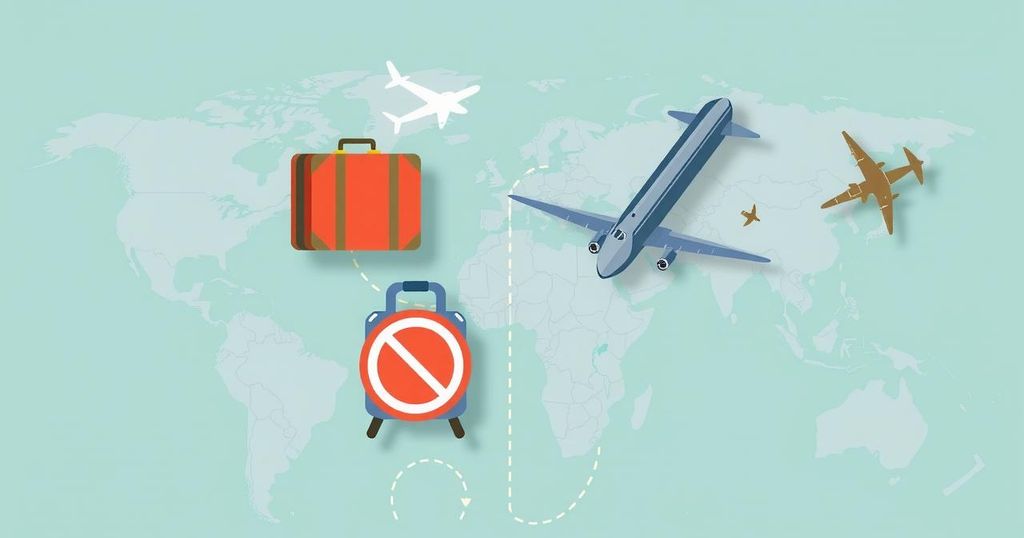World news
AFRICA, CUBA, DONALD TRUMP, JOE BIDEN, MYANMAR, NATIONAL SECURITY, NBC NEWS, NORTH AMERICA, POLITICS, SIERRA LEONE, SOUTH AMERICA, STATE DEPARTMENT, SUDAN, TRUMP, TRUMP ADMINISTRATION, TRUTH SOCIAL, U. S, U. S. STATE DEPARTMENT, U.S. ELECTIONS, US PRESIDENTIAL ELECTION, VENEZUELA
Ethan Kim
0 Comments
Trump Issues New Travel Ban Affecting Nearly 20 Countries: What Travelers Need to Know
President Donald Trump has enacted a new travel ban affecting nearly 20 countries, primarily citing national security concerns. The ban fully restricts entry from 12 countries and partially bans 7 others. Taking effect on June 9, 2025, this travel proclamation could complicate travel for affected nationals, who are advised to seek guidance from legal experts and official sources.
In a significant move, President Donald Trump has formalized a new travel ban affecting nearly 20 countries, citing national security concerns as the primary reason. This ban, announced on Wednesday, will fully bar or partially restrict entry to the United States for nationals of countries like Afghanistan, Burma, Chad, the Republic of Congo, Equatorial Guinea, and several others. The rationale for these restrictions stems from what the White House describes as high visa overstay rates and insufficient screening protocols.
Critically, the ban extends to countries such as Iran, Libya, Somalia, Sudan, Yemen, and Haiti. Furthermore, nationals from Burundi, Cuba, Laos, Sierra Leone, Togo, Turkmenistan, and Venezuela will also face travel suspensions, likely complicating travel plans for many. This is reminiscent of Trump’s 2017 travel ban—which primarily targeted majority-Muslim nations. That policy saw convictions held against it, with protests and legal challenges erupting across the country.
Interestingly, although the ban restricts entry for many, there are exceptions. Lawful permanent residents, current visa holders, and certain visa categories are exempt, but details on what constitutes U.S. national interests for other applicants remain vague. This move also aligns with Trump’s 2024 campaign promises, clearly portraying a tough-on-borders stance.
The repercussions of this proclamation will significantly affect international travelers. Those seeking student, tourist, or work visas from the banned nations could encounter obstacles or outright denials. Those already residing in the U.S. may find it possible to renew their visas, but returning to the States after a trip abroad could come with complications.
Starting at 12:01 a.m. ET on June 9, 2025, travelers from the banned countries could be denied boarding by airlines or turned away at U.S. ports of entry. Furthermore, individuals from the countries facing partial restrictions may also experience increased scrutiny—this could result in delays, or potential denials of entry based on several factors, including visa types and the purpose of their visit.
For those who had already purchased tickets prior to this proclamation, it is advisable to connect with their airlines and reach out to U.S. embassies or consulates for guidance. While some exceptions for entry may apply, travelers coming from fully banned countries are anticipated to face denial. Those from partially banned nations might still travel but must be prepared for additional requirements and screenings before entering the U.S.
In light of this announcement, consulting the U.S. State Department’s website or an experienced immigration lawyer for accurate and updated instructions is strongly recommended. It is essential to be proactive, particularly for individuals from affected countries or those with relatives who are trying to gain entry into the United States.
In summary, President Trump’s new travel ban impacts nearly 20 countries, reflecting ongoing national security concerns. While it mainly restricts entry for nationals of specific countries, exceptions exist for some visa holders. The ban takes effect in June 2025 and poses significant challenges for travelers. Those with travel plans should stay informed through official government channels and consider legal advice for their cases.
Original Source: www.usatoday.com




Post Comment